![]()
By Tim Margetts

(PROLOGUE: Being the first book in The Great Humbling of Cupid, wherein the self-proclaimed Master of Love prepares to unveil his genius before the Olympian Court… unaware that divine ears have heard, and mischief is afoot.)
Upon a cloud where roses lay,
With swirling scent and golden ray,
There lounged the god of vain design,
A poet lost in dreams divine!
At least—so Cupid oft declared,
For none had known a soul so rare,
A voice so rich, so pure, so bright,
That mortal hearts would set alight!
"Oh Love! Oh Me! Oh Fate so Grand!"
He sighed and cast a trembling hand,
For what he wrote would soon be known—
A work so fine it shamed the throne
Of muses nine—who, poor and weak,
Had failed his lofty heights to reach.
He dipped his quill in nectar’s gold,
And sighed again, for all must hold
Their breath when art divine is penned,
And lesser bards must bow—and bend.
Thus, from his lips, a wretched tune,
A mangled verse, a poet’s doom—
A crime against the muses nine,
An insult dressed in clumsy rhyme.
"O love! O light! O—wondrous bliss!
To feel the lips! The touch! And also—The kiss!
Where two hearts beat and merge as one,
Like a ham covered in melted butter!"
(Wait—nay, that metaphor is weak...
Perhaps instead—two doves? An egg?)
No matter! ONWARD! Let me sing,
The triumph love alone may bring!)
"For none may know what power I wield,
My quiver doth quiver with the fates reveal!
A single arrow! Lo, it flies!
(As swift as honey leaves the hives!)
And where it strikes, the soul is turned!
(Much like... a—well-cooked lamb is burned!)
Oh fie! Oh fate! Oh power sweet!
That brings all lovers to their feet!
So let them worship, let them see me!
There is no god as grand as me!
And when Olympus calls me forth,
They’ll kneel and weep and beg and—and know my worth!"
Cupid paused, lips pursed in thought,
Then sighed, for surely none had wrought
A verse so fine, so rich, so deep,
That even gods would surely weep!
He cast his quill with flourish wide,
And twirled a golden curl with pride.
With one hand o’er his tender chest,
He gasped, "By Jove! Have I been blessed?"
The Muses? Feeble, weak, and blind!
But he? The poet most divine!
And when he stood before the throne,
Apollo’s lyre would seem a groan!
And Jupiter, in kingly seat,
Would weep—and kiss his perfect feet!
He clutched the scroll, his masterpiece,
And swooned at all its grand motifs.
"For beauty such as mine alone,"
He whispered soft, in honeyed tone,
"Is not of earth, nor sea, nor sky—
But woven where the angels sigh."
A cough. A sniff. A muttered sigh—
A sound that made the great god cry.
Not tears of joy, nor love’s embrace,
But horror flashing on his face.
He turned, he blinked, his shoulders tight,
And in the shadows, bathed in light,
Three figures stood, their laughter hushed,
Yet cheeks were pink, and bellies crushed.
Their breath was strained, their shoulders shook,
Their eyes alight with mocking looks.
For what they’d heard—oh, what delight!
A gift so rare, so pure in plight!
Then Mercury, the fleet and sly,
Wiped at a tear and heaved a sigh.
“Oh, do go on! A finer verse
Hath never graced this universe!”
And Laverna, lithe and keen,
Spoke soft, but with a wicked gleam:
“I swear, my heart, once black and cold,
Now weeps in love! A sight to hold!”
But worst of all, Discordia stood,
And grinned a grin that boded blood.
She traced her nails along her cheek
And crooned, as though she’d grown quite meek:
“Dear Cupid, master, prince of love,
Thy words have struck like stars above!
But tell me this, if thou dost please—
How long have gods enjoyed such ease?”
Cupid paused—his head held high,
Yet flickered doubt was in his eye.
For praise was sweet, yet strangely spun,
Like wine that burned when it was done.
“Why, all eternity and more!
And soon the gods shall kneel before—”
Yet here, a glance, a fleeting smile,
Was passed between the trickster’s guile.
A look that sealed his weaving fate—
A jest begun, a plan ornate.
Then Mercury, with glinting glee,
Did bow and grin most eagerly:
“Oh, master, poet, king of air,
We shall await thee—be aware.”
For Cupid, bright and unaware,
Returned unto his cloud-lit lair,
And there he dreamed of praise and fame,
Of lovers swooning at his name.
And yet, within the halls of gold,
A whisper burned, a scheme was told.
For Mercury, with nimble hand,
Had stolen Cupid’s quiver grand.
And Laverna, quick and keen,
Had swapped his arrows sight unseen.
And Discordia, full of guile,
Had plotted true, and grinned a while.
And so, within the mortal streets,
Where Corinth’s lovers roamed in fleets,
The first grand folly soon would strike,
And love itself would twist alike.
| Author Notes |
He sang of love in clumsy rhyme,
A butchered verse, a crime sublime. And so the gods, in jest most grand, Would teach him artâby mischiefâs hand. Thank you, Pam (Pamusart) for driving me to this, my second Epic Saga. I hold you fully responsible :-) |
![]()
By Tim Margetts
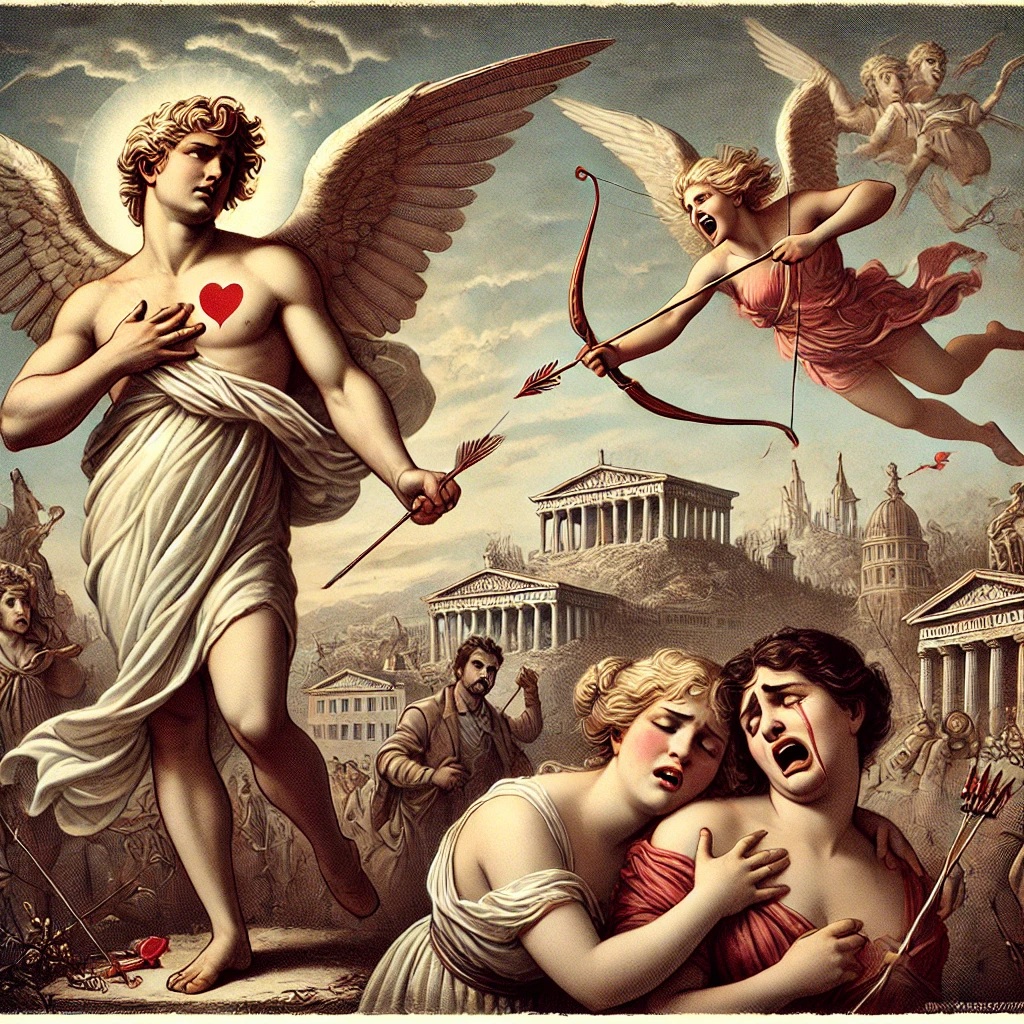
(Wherein Cupid looses an arrow, yet love does not bloom; and Corinth, city of romance, is plunged into despair.)
Upon a cloud where roses lay,
With swirling scent and golden ray,
There lounged the god of vain design,
A poet lost in dreams divine!
But now his musings took their flight,
For duty called—his grandest rite!
To shape the hearts of those below,
To weave the bonds that lovers know.
A maiden fair, a suitor true,
Upon the streets of Corinth flew,
Their hands entwined, their eyes alight,
A perfect pair—a love set right.
"Ah, such a match! Such hearts so bold!"
"Their love shall shine in songs retold!"
"By Cupid's hand, their fates shall twine—"
"A bond unshaken! Strong! Divine!"
With steady grip and knowing smile,
He nocked an arrow, paused a while,
Then loosed the string—a whisper light,
A perfect shot! A flawless flight!
Yet high above, unseen, unheard,
There lurked a thief, her fingers stirred.
Laverna, mistress swift and sly,
Had watched, had waited, grinning wry.
And as the golden shaft took wing,
She plucked its twin with nimble spring.
A flick, a swap—so quick, so fleet,
That none could mark the cunning feat!
And down it plunged, the cursed dart,
Not love to spark, but severed hearts.
It struck the suitor, proud and bright,
And in his chest—a hollowed night.
His hand released, his breath ran cold,
His eyes grew dark, his heart turned old.
A gasp! A cry! A shattered moan—
The love he’d felt was now undone.
"Away, away!" he reeled, aghast,
"This feeling false, this love won't last!"
"A trick! A lie! A fleeting dream!"
"No more, no more—I break, I leave!"
And at his feet, the maiden fair,
Her lips apart, her tear-stained stare,
Reached forth, in sorrow, lost and numb—
Yet he had turned. Her love was done.
A single thread, a single sting,
Yet ripples formed—a crumbling ring.
For all across the streets so wide,
Where lovers walked and hearts confide,
The break began—a plague, a storm,
Where bonds of love were ripped and torn.
A husband stood, his fingers tight,
And loosed his grasp mid-waltz, mid-flight.
"My heart is cold," he whispered low,
"I know not why—but I must go."
A bride-to-be, in lace so fine,
Did halt her steps at temple shrine.
"A moment past, I swore my love—"
"And now... and now, 'tis dust above!"
A bard, whose songs of passion soared,
Now shattered every oaths he swore.
He cast his lute into the sea,
And cried, "No love shall sing through me!"
A painter stared upon his muse,
Yet all he saw were shapeless hues.
"Her beauty fades!" he choked, confused,
"A wretched mask! A form misused!"
The streets of Corinth, soft with bliss,
Now rang with wails, with love amiss.
Where once the roses twined so red,
Their petals fell—the bloom was dead.
From high above, the archer's eyes,
Looked down upon the mortal cries.
His lips grew pale, his hands unsteady,
His voice, once smug, now thin, unready.
"But—this was not my spell, my craft!"
"Some cruel device, some twisted shaft!"
"No, no, no! This cannot be!"
"Love should not turn! Should not flee!"
His wings unfurled, his stance unsure,
For never had his arrows erred.
Yet now, beneath his artful gaze,
The world had dimmed, the hearts decayed.
Yet high above, in marbled halls,
The echoes rang—the tricksters called.
For Laverna, bright with glee,
Did whisper soft, so mockingly:
"Oh, Cupid dear, what fates conspire?"
"What cruel misstep doth thus transpire?"
"Was it thy aim? Thy fleeting grace?"
"Or didst thou miss—thy hand misplaced?"
And Mercury, with laughing breath,
Did feign a sigh, a gasp, a death:
"Oh, love is fickle, love is pain—"
"Who knew thine art could fail so plain?"
Yet Discordia, full of guile,
Did simply watch—and grin the while.
For in her palm, so light, so small,
The golden apple lay—a thrall.
"Let love unravel, let it break—"
"For soon enough, more fun we’ll make."
And thus, as Cupid stared in woe,
As Corinth’s cries rose loud below,
The gods above, in mirth and jest,
Prepared once more—love’s next great test.
| Author Notes |
And so Cupid, who thought himself so grand
Finds everything gets out of hand Love is strained, does not run true, His boastful words he may start to rue. |
![]()
By Tim Margetts
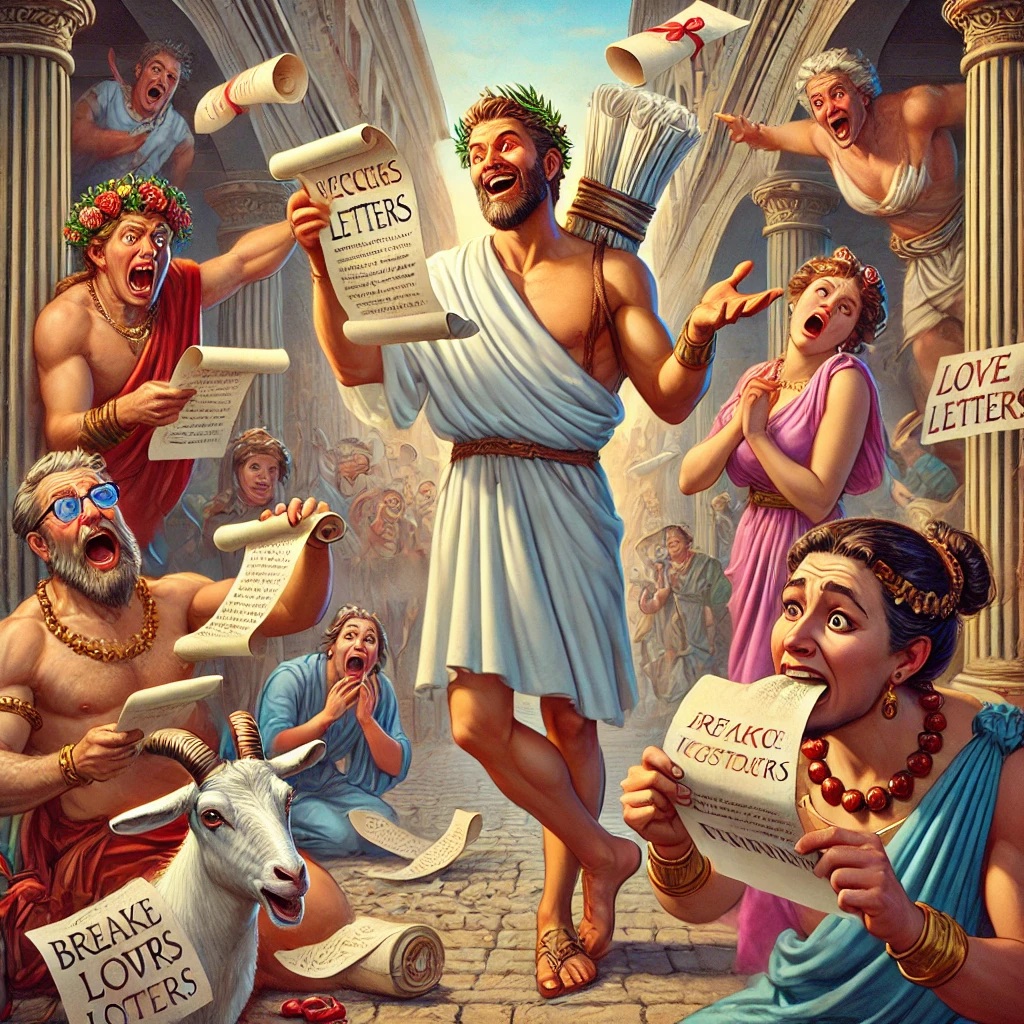
(Wherein Mercury, swift and sly, delivers messages awry, and Corinth’s lovers fall deeper into ruin.)
From Olympus' heights, a pranksters tryst,
As Cupid gnashed his teeth and swore,
His hands did wring, his curls did twist,
For love had fled—and love was lore.
Yet Mercury, with knowing grin,
Did turn to Laverna, pleased with sin.
"A work well done! A jest most fine!"
"Yet tell me, friends, now what of mine?"
For tricks were not yet fully spun,
And one more blow must yet be dealt.
For mortals, lost in love’s decay,
Still clutched at words, still wept, still knelt.
And words, oh words! So soft, so sweet,
Yet sharp as knives in Mercury’s keep.
For love did thrive on whispered notes,
On vows once penned, on dreams once wrote.
And so he laughed, and so he leapt,
His feet as swift as wings in flight,
A thief of tongues, a weaver sly,
To twist the ink beneath the night.
In Corinth’s streets, ‘twas common game,
For lovers oft did send their names,
In letters inked, in words so fine,
To weave their hearts through written lines.
A poet sighed, his quill in hand,
And wrote his love, so fierce, so grand.
"To thee, my rose, my heart, my breath,"
"A love unyielding, sure till death."
Yet Mercury, with wicked glee,
Did pluck this note, so carefully.
And with a flick, and with a quirk,
Rewrote the name—to one most curt.
So when the scroll was duly read,
The poet’s heart was filled with dread.
For what he thought had reached his love,
Had found instead his father’s glove.
"My son! My heir! My blood! My kin!"
"What madness grips thy soul within?"
"To speak such words, so fond, so dear—"
"Oh son, I never knew thee queer!"
Thus in the streets, one heart did break,
And in its place rose great mistake.
Yet more misdeeds would Mercury weave,
For letters, lost, still begged reprieve.
A maiden fair, with trembling hands,
Did write her vow to wed her man.
"My love! My sun! My joy, my king!"
"Upon the morn, my heart shall sing!"
But Mercury, that cunning sprite,
Did twist her words in darkest night.
And so the note, in careless fate,
Was read by one—a goat named Pate.
"Oh joy! Oh love! Oh fate divine!"
"At last, a mortal calls me mine!"
The goat did bleat, did stomp, did prance,
And sought the temple for romance.
Yet worse was still to come anon,
For Mercury, with swiftest con,
Had seized the letters meant to mend
The broken hearts that sought amends.
A lady proud, her sorrow steeped,
Did write her love in careful script.
"Forgive me, dear, for all my woe!"
"I vow I’ll never let thee go!"
Yet once again, the scroll was turned,
And Mercury, with lips that burned,
Ensured the words were changed anew,
So what was love became adieu.
"I curse thee, fool! I end our tale!"
"My love is dust! Our bond is pale!"
"Go hence! Be gone! Be naught to me!"
"I cast thee to the endless sea!"
And when her love did read the lines,
His heart did snap, his soul did pine.
A cry! A wail! A hopeless moan!
A man now drunk and all alone.
And so, by Mercury’s cruel jest,
The hearts of Corinth found no rest.
For lovers pined and sought to mend,
Yet all their letters met their end.
A bard who wooed a noble’s wife,
Received instead a duel for life.
A mother’s words of sweet embrace,
Were sent instead to warriors’ gates.
And in the square, at break of dawn,
A priest did find—a goat in song.
From heights above, young Cupid wept,
His lips agape, his sorrow deep.
For love was speech, and love was prose,
And love was ink upon the rose.
Yet now the words were all but torn,
And lovers grieved where they had sworn.
A cry, a curse, a mournful plea,
A poet drowned within the sea.
"No more, no more! Oh, fate most dire!"
"What god conspires? What hands inspire?"
"My art, my will, my fate, my task—"
"Is turned to ash, a shattered mask!"
Yet in the halls where laughter grew,
Did Mercury, most pleased, pursue.
"Oh Cupid, friend, thy work is bright!"
"Thy art is chaos, pure delight!"
And Laverna, soft in mirth,
Did shake her head, for all was worth.
"A jest well played, a tale well spun,"
"And yet, dear friends—our work’s not done!"
Then Discordia, fair and wild,
Did raise her hand, did grin, beguiled.
For in her palm, as yet unseen,
Lay golden fruit—so ripe, so keen.
"Oh love is fickle, love is war—"
"Let’s see what happens when there’s more."
And thus, as Corinth burned in woe,
The stage was set for strife to grow.
Yet still, the streets of Corinth sighed,
With love undone and hearts denied.
A silence grew—a vacant space,
Where lovers once would meet, embrace.
And in the halls of marble white,
A goddess watched—a troubled sight.
For Aphrodite, fair and tall,
Had seen the cracks—had heard the call.
No offerings laid at temple shrine,
No doves released, no songs divine.
Where once her name was sung in prayer,
Now lovers cursed and filled the air.
She rose—a shadow crossed her brow,
Her lips pressed tight, her breath was low.
"What madness grips my city fair?"
"What wretched curse lingers there?"
She turned her gaze—Olympus wide,
And knew some hand had played with pride.
Yet still, she knew not where, nor why—
Only that love began to die.
And so, with step both firm and fleet,
She left her throne, her halls, her seat.
For Corinth wept, and hearts lay torn—
And Aphrodite must restore.
| Author Notes |
Where Aphrodite's temple shone,
The tricksters played, their seeds were sown. Her sonâs own art, now bent, defiledâ And Corinth mocked by gods beguiled. |
![]()
By Tim Margetts
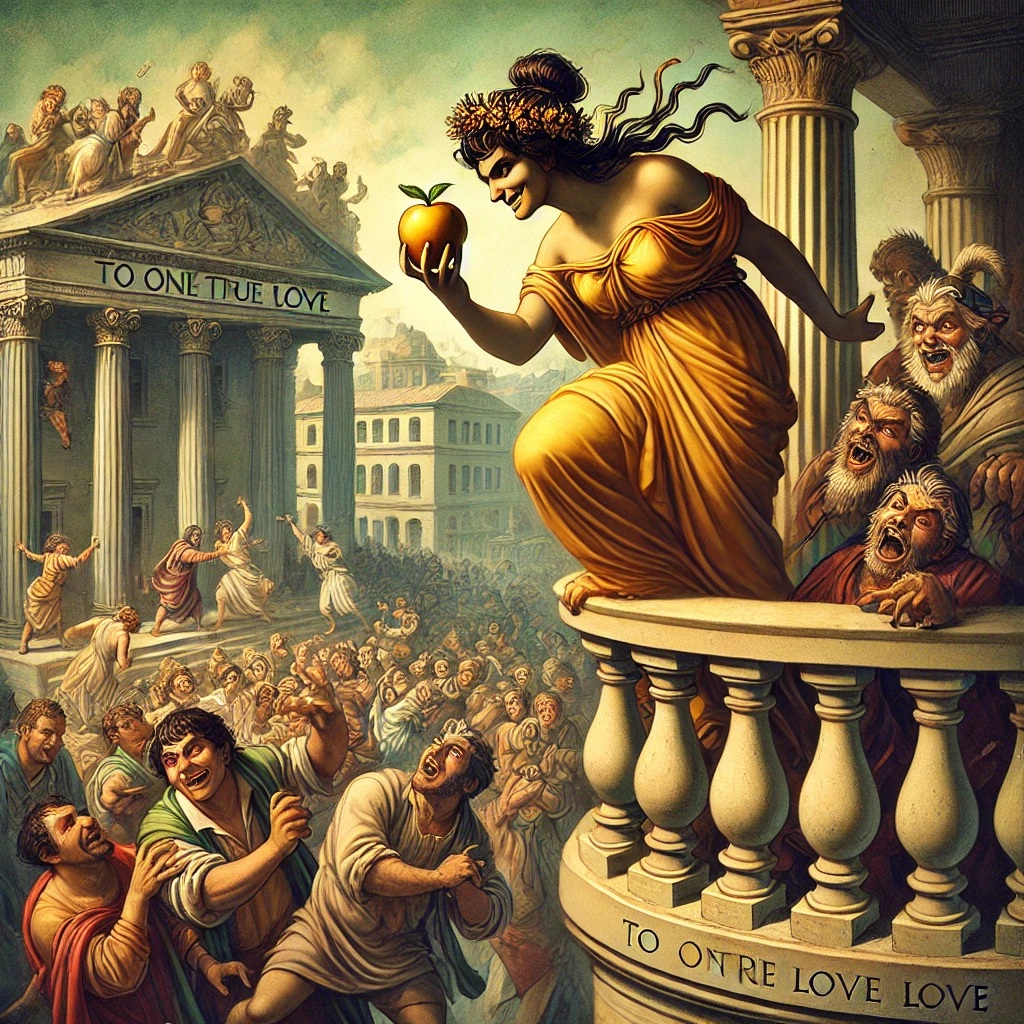
(Wherein Discordia, Queen of Strife, casts the final stone into the flood, and Aphrodite arrives to restore love—only to find herself drowning in madness.)
Upon the heights where laughter sang,
Where gods of wit and mischief thrived,
There lounged Discordia, poised in thought,
Her schemes not yet full contrived.
For Corinth lay in disarray,
Its lovers torn, its hearts estranged.
Yet still, some clung to hope’s embrace,
Still prayed for love—still called its name.
And that, she thought, would never do.
Not while the game had yet to play.
So with a smirk, with knowing hands,
She shaped the trick to end the day.
A golden fruit, a shining prize,
More fair than all the stars of night.
It bore no wound, it bore no stain—
Its surface smooth, its gleam divine.
Yet in its core, a shadow lay,
A curse so fine, so swiftly spun,
That all who gazed upon its form
Would claim it bore their destined one.
"For love is war, and war is sweet,"
"Let Corinth fall upon my feet."
"One apple, one prize, one perfect bond—"
"Let all believe their fate’s beyond."
She traced a name upon its skin,
A simple phrase, a fateful jest,
"To the One True Love" it read,
A lure to tear the world to shreds.
Then from the heights she let it drop,
And watched it spin, and watched it fall,
A jewel descending into strife,
To break the fragile hearts of all.
Through market square, through temple halls,
The golden fruit did gleam and roll.
And first to see its shining form
Was one whose heart still sought its home.
"Oh fate! Oh gods! A sign divine!"
"This fruit doth bear my lover's name!"
"For see—its glow! Its golden hue!"
"It calls me forth! It speaks it true!"
He lunged, he grasped, he held it tight,
But love, once claimed, is never sure.
For others saw, and others swore,
"That apple, fool, was meant for ME!"
A woman reached, her fingers clenched,
Her lips curled back in savage growl.
"You dare to steal my destined fate?"
"That fruit was meant for ME, thou knave!"
And so the first blow struck the ground,
And then another, then a cry,
A shove, a slap, a broken vow,
And love became a battle high.
For lovers swore and rivals raged,
As men and maids both old and young
Took up their arms, their fists, their knives,
And fought for love with sword and tongue.
The fruit was tossed, the fruit was claimed,
The fruit was lost, then snatched again.
A war began, a tale untold,
And Corinth fell into the fold.
A baker clashed against his wife,
A poet wrestled with his muse.
A noble swung upon his page,
A scholar cursed the gods above.
"This is my fate!"
"This is my love!"
"The apple speaks!"
"The fates command!"
And so the blood began to spill,
And so the city came undone,
And so Discordia, high above,
Did sigh and sip her stolen wine.
From temple high, where doves took flight,
Where incense curled and roses lay,
A goddess stepped into the storm
And wrinkled soft her golden brow.
For Aphrodite, Queen of Love,
Had felt the shift, had heard the cries.
No temple hymn, no whispered vow,
No offerings laid at sacred feet.
Instead—a war upon her land,
A siege upon her blessed name.
Her city, fair, her Corinth bright,
Now burned with love turned into fight.
She stepped into the raging street,
Her footfalls soft, her presence vast.
And yet, where once her beauty ruled,
Now only madness bowed its head.
"Enough," she spoke, her voice divine,
"Enough of this—thy love’s a lie!"
"This fruit bears no true heart’s design!"
"It speaks no names! It weaves no fate!"
Yet none did hear, yet none did heed,
For love is blind and folly sweet.
And still they fought, and still they bled,
And still the apple rolled ahead.
Aphrodite, breath held tight,
Pressed forth against the warring crowd,
She raised her hand, she cast her charm,
Yet even love’s own goddess failed.
For Discordia, sly and bold,
Had worked her trick too deep, too well.
And even now, Olympus watched,
As love and war became as one.
And on the heights, Discordia smiled.
A challenge set, a jest fulfilled.
For even love’s own mighty queen
Could not undo what chaos willed.
And so the city wept in strife,
As Aphrodite stood, confined.
Her power shook, her wisdom waned—
For love was war, and love was blind.
| Author Notes |
Where roses bloomed in passionâs grace,
Now swords were drawn in loveâs embrace. For even she, with crown divine, Could not unbind what fate designed. |
![]()
By Tim Margetts
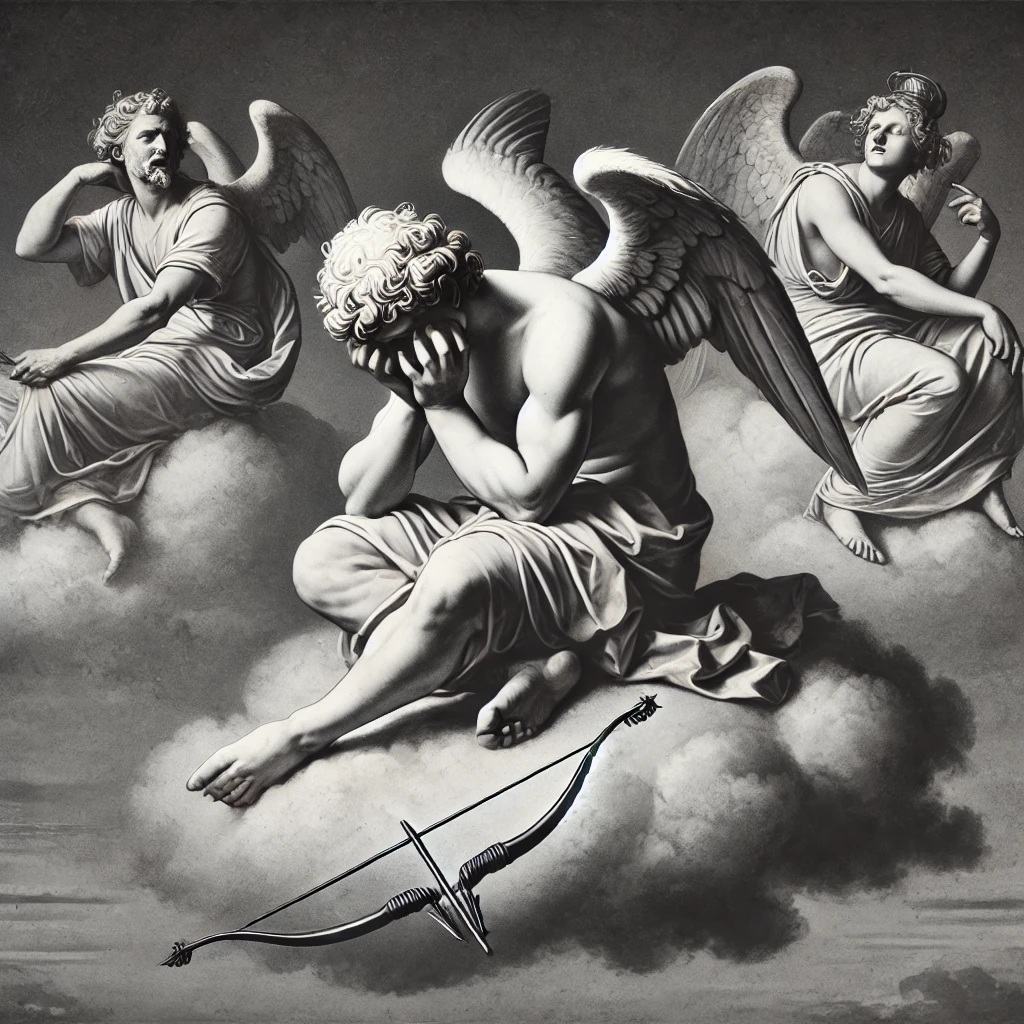
(Wherein Cupid, stripped of pride and power, weeps for his folly, and the tricksters reveal their jest.)
Beneath the stars, beneath the sky,
Where clouds of silver, soft and bright,
Had once been home to love’s own lord—
There sat a god, devoid of light.
No lyre’s tune, no poet’s call,
No sigh of lovers in the night.
Where once the world had sung his name,
Now Cupid mourned in wretched plight.
For Corinth, fairest of the fair,
Had shattered, broke, and torn apart.
Where once he’d fashioned love’s embrace,
Now lay the wreckage of his art.
He clutched his curls, he wrung his hands,
His bow cast down, his quiver bare.
"Oh love, oh fate, oh gods unkind—"
"What hand hath wrought this fell despair?"
"Did I not strike with tender aim?"
"Did I not bless, did I not weave?"
"Yet all I touched was turned to dust!"
"All hearts I bound now break and grieve!"
"No joy remains, no passion sweet—"
"No lover’s breath, no promise deep!"
"No whispered vow, no sacred bond—"
"All love is lost—oh let me weep!"
And weep he did, in melancholy,
Upon his throne so torn with woe.
His shoulders shook, his feathers bent,
His voice rang soft, yet none below
Could hear his pain, could heed his cries—
For love had vanished from the land.
And from above, in shadow curled,
The tricksters watched—their jest at hand.
In laughter bright, in mirth unseen,
Where mortals wept, where gods did gleam,
The trio stood, their work now done,
And gazed upon what fate had spun.
"Oh, see him there!" quoth Mercury,
"A god so fine, a prince of hearts!"
"Yet now he sobs, yet now he wails—"
"A fool undone by folly’s art!"
"A jest most rich," quoth Laverna fair,
"A game well played, a scheme most grand!"
"What once he held as firm and true,"
"Did crumble swift beneath his hand."
But Discordia, bright with guile,
Did only watch, did only smile.
She traced the air, she hummed a tune,
And let her laughter rise the while.
"O Cupid, dear, thy reign is torn—"
"Thy golden arrows bring no bliss."
"For love is fickle, love is pain—"
"And see? Thy hand hath made it this!"
Then Mercury, with knowing glance,
Did step unto the cloud so high.
He bowed, he grinned, he waved his hand,
And spoke unto the god’s own sigh.
"Oh Cupid, prince, why dost thou mourn?"
"What sorrow strikes thy golden throne?"
"Dost thou not see? Dost thou not know?"
"Thy work was fair—and thine alone!"
For silence fell, and Cupid stilled,
His eyes so wide, his breath so thin.
For though he wept, for though he grieved,
A seed of doubt now stirred within.
His arrows failed, his aim was lost—
Yet was it fate, or was it hand?
And Mercury, with softened smile,
Did set the bait, did set the snare.
"Perchance, dear friend, thy gift has waned."
"Perchance thy art no longer sings."
"For even gods may falter once—"
"May find their craft no longer brings."
And Laverna, with playful grace,
Did twirl his bow within her hands.
"A tool so fine, a weapon bright—"
"Yet why, dear Cupid, dost it fail?"
And Discordia, low and soft,
Did whisper forth the final blow.
"Could it be luck? Could it be fate?"
"Or could it be—a hand below?"
Like sudden dawn, like morning flame,
The thought did strike within his mind.
His arrows missed—his love had failed—
But not by chance, nor fate unkind.
His quiver lost, his bow still true,
His hand still firm, his skill still bright—
Then what, dear gods, had cast this curse?
What hand had stolen love from light?
"A jest! A trick! A crime most foul!"
"It was not I—it was not fate!"
"Some hand hath played upon my craft!"
"Some god hath turned my skill to hate!"
He rose, he burned, he swore his name,
His fists now clenched, his sorrow spent.
"Reveal thy face! Thou wretched fiend!"
"Come forth! Confess! Be not content!"
And from the heights, the trio laughed,
And bent in mirth, and bowed in jest.
Then Mercury, with perfect poise,
Did flourish forth—his grand address.
"Oh Cupid, fool, dost thou not see?"
"Thy woe is ours, thy grief is glee!"
"A jest, a prank, a trick well-spun—"
"And now behold—our work well done!"
"Thy arrows bent, thy letters torn,"
"Thy lovers lost, thy city worn."
"Thy name, once sung, is now despised—"
"And all is naught but chaos' prize!"
"For thou, O Love, wert proud and vain—"
"And now thou know’st—Love is but pain."
A breath; A pause—A silence vast.
And then, a scream, a wail, a cry!
A thunder struck within the sky!
A voice so fierce, so steeped in wrath,
That gods above could only laugh!
"How dare thee! How vile, how low!"
"To twist my hand, to forge my woe!"
"To take my gift, to turn it black—"
"Thy names shall burn! I shall strike back!"
And Mercury, still full of mirth,
Did shrug, did smile, did laugh once more.
"Then fire, O Cupid, fire true—"
"If thou hast aim—we welcome war."
| Author Notes |
And so the night in echoes rang,
As Cupid rose with wrath untamed. No jest would stand, no trick endureâ For love, once lost, would rise reclaimed. |
![]()
By Tim Margetts
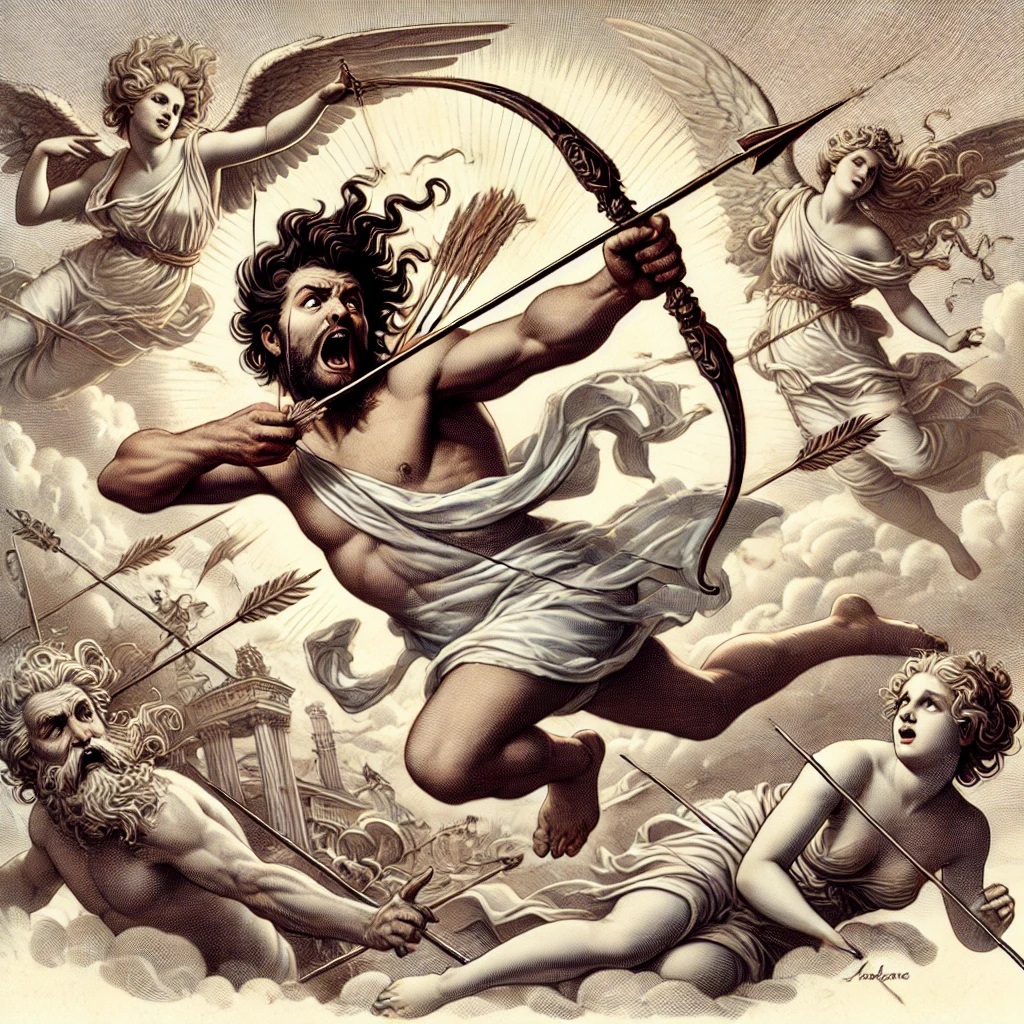
(Wherein Cupid, in fury, fires his arrow, yet finds himself ensnared by the greatest jest of all.)
The heavens shook, the thunder rolled,
As Cupid rose with wrath untold.
His curls unkempt, his cheeks aflame,
His lips a snarl, his voice a claim.
"A jest! A trick! A crime most foul!"
"A mockery of Love’s own name!"
"By heavens high and earth below,"
"I strike thee down—I end this game!"
Upon the clouds, his hand did lift,
His bow once fallen, now reclaimed.
A single arrow, straight and bright,
A vengeful dart, in fury framed.
For Mercury, with laughing stance,
Did cross his arms, did tilt his brow.
"O Love, so fierce, so full of fire,"
"Shall vengeance truly strike me now?"
"Then fire thy dart, and strike me true!"
"Or dost thou fear what fate may do?"
Yet Cupid heard no mocking tone,
No second thought, no wretched pause.
His fingers curled, his wings unfurled—
And with his wrath, he loosed his cause.
A golden streak, a flawless flight,
A shaft divine, a dart of light!
It soared, it shone, it screamed through air—
A fatal shot, so pure, so fair!
And yet—
A whisper moved, a breath unseen,
A wind so slight, yet swift and keen.
A flicker, soft, a hand unseen—
A trickster's touch, so light, so lean.
And as the arrow pierced the sky,
It twisted—turned—was bent awry!
A breath mislaid, a fate miscast,
A streak reversed—and Cupid gasped.
For in that space where gods looked on,
Where laughter bloomed, where jest was high,
His vengeful dart, his wrathful blade,
Did turn—
Did strike—
Did claim his thigh.
A silence vast, a hush profound,
A moment still—
Then Cupid fell.
A pause. A blink. A breath held tight.
Then laughter burst upon the height!
A ringing peal, a roaring cheer,
That echoed through Olympus bright.
For Mercury, in doubled mirth,
Did fall to cloud, his sides in pain.
"Oh fates above! Oh jest divine!"
"He sought revenge—and yet was slain!"
And Laverna, soft and light,
Did clutch her chest, did heave a sigh.
"A shot most fair! A strike most bold!"
"And yet, dear Love—thy aim went wide!"
Yet Discordia, still and tall,
Did watch the scene, her eyes aglow.
For where Love lay, now breathless, lost,
A deeper jest began to grow.
His breath came quick, his lips went dry,
His fingers shook, his vision blurred.
A warmth unfurled within his chest,
A pulse unknown, a call unheard.
His anger bent, his wrath undone,
His mind now lost to longing’s call.
His heart, once fire, now drowned in need—
For love had struck—
And he had fallen.
Yet not for maids with golden hair,
Nor mortal souls with whispers sweet.
Nor heroes bold, nor muses fair,
Nor queens adorned in silks complete.
No, Cupid’s heart—so proud, so vain—
Had turned its eye to death’s domain.
For deep within the halls of shade,
Where souls did sigh and spirits fade,
There sat a king of blackest shroud,
With crown of bone and gaze unbowed.
And Cupid, gasping, clutched his chest,
His pulse a storm, his breath a sigh—
For never had he known before
A love so vast, so cold, so dry.
A cruel obsession, fierce and dire,
A yearning bent on hopeless fire.
For he, the god of love’s own thread,
Now pined for one among the dead.
And from above, in golden mirth,
The tricksters laughed—a jest complete.
For what could be a finer fate,
Than Love enslaved to love’s defeat?
| Author Notes |
He loosed the dart in vengeful might,
Yet love's own hand betrayed his flight. For wrath was blind, and fate was sly. And so Love fell, ensnared thereby. |
![]()
By Tim Margetts
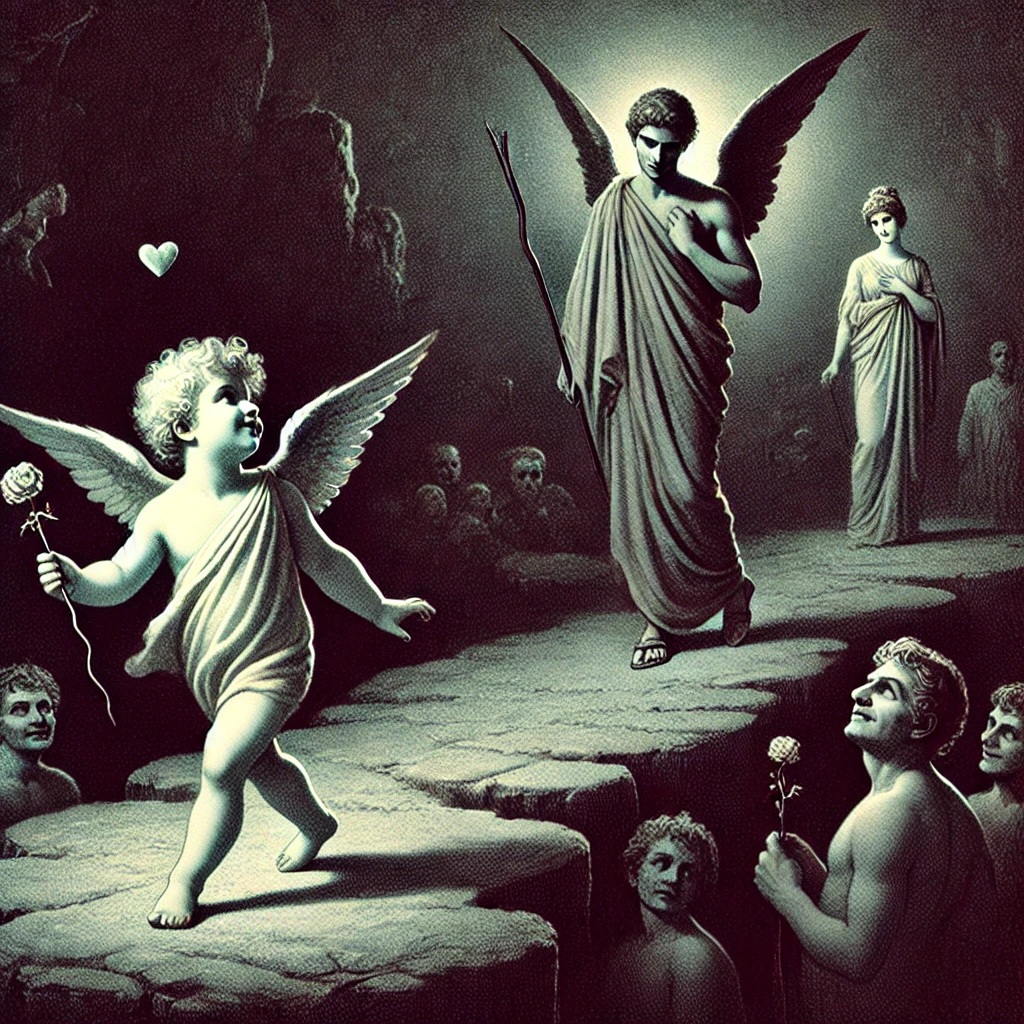
(Wherein Cupid, madly in love, stalks Hades while Olympus roars with laughter, Persephone enjoys the show, and Aphrodite demands justice from Zeus.)
Beneath the earth, where shadows lay,
Where Lethe’s tide did drift and sway,
Where souls in whispers begged for peace,
A problem stirred that would not cease.
For in the halls of endless rest,
Among the dead, among the blessed,
There walked a god—a prince of love,
His wings aflame, his heart distressed.
His sighs did echo, deep and low,
His hands clasped tight, his footsteps slow.
For never had he known before
A love so pure—so dark—so cold.
And where he walked, the spirits turned,
They gasped, they gawked, they fled in fright.
For none had seen the Lord of Love
Descend into the endless night.
And in the throne of silent stone,
Where nothing stirred and nothing shone,
There sat a king—unmoved, unbowed,
His brow pressed firm beneath his crown.
"Oh Hades, King! O Death’s delight!"
"A heart like thine is rarest bright!"
"For love is fleeting, weak, unkind—"
"Yet thou art strong! So stern, so blind!"
"No fickle heart, no poet’s muse,"
"No fool to weep when tempests rage!"
"Oh grant me thee, oh let me stay!"
"For love is long, and love is sage!"
The words did flow, the whispers grew,
The Lord of Death sat deep in thought.
Then with a sigh—so vast, so slow—
He turned his head, and answered not.
For in the dark, beneath the stone,
Where time did bend, where fate was known,
No sound was made, no word was told—
For Hades simply stared—so cold.
And on the throne, in silence vast,
He raised a hand, and gave a sigh.
Then rubbed his temples, slow and firm,
And murmured soft—"O gods, but why?"
But from the dark, where petals lay,
A voice arose—a voice so sweet.
A chime, a lilt, a laugh so light,
That even Lethe bent to meet.
For Persephone, with smile wide,
Did lean upon the throne’s grand side.
Her golden hair, her knowing gaze,
Did shine within the death-lit haze.
"Oh husband dear, what fate is this?"
"A suitor bold, a love amiss?"
"A god of passion, lost in woe?"
"Oh what a gift! A tragic show!"
"To think that Love should come to kneel—"
"That Love should weep, that Love should reel!"
"A suitor sweet, so flushed, so bright—"
"Oh, let him stay! Oh, let him fight!"
She watched as Cupid sighed and swayed,
As hands were clasped, as vows were laid.
Her lips did curve, her voice was gold—
"Oh love, oh love, oh tale so bold!"
But Hades, still with furrowed brow,
Did raise a hand, did shake his head.
"Enough, enough. My halls are full."
"No love shall bloom among the dead."
"Take back thy words, unbind thy heart."
"No sighs shall stir, no vows be said."
"Return above, seek love elsewhere—"
"For love is naught within the dead."
Yet Cupid wept, yet Cupid swore,
Yet Cupid followed evermore.
And thus, among the halls of night,
A stalker roamed in endless plight.
And from the heights, where gods did gaze,
Where thunder rolled and wine was poured,
The halls of Olympus rang with glee,
For Cupid’s shame was now adored.
Apollo leaned upon his lyre,
His golden curls a tangled mess.
"Oh gods, oh fate! Behold, be true—"
"Dost Love now pine? Dost Love now woo?"
Athena smirked, her helmet high,
Her lips pressed tight to hide her mirth.
"A tragic fate, a poet’s doom—"
"Yet see how Love doth beg for worth!"
And Dionysus, drunk and bold,
Did raise his cup, did toast the jest.
"A wretched plight! A fate so cruel!"
"Let wine be poured! Let fools be blessed!"
For all did laugh, for all did cheer,
As Cupid sighed, as Cupid swooned.
For none had seen the god of Love
So helpless, lost, and so marooned.
But far beyond the halls of jest,
Where laughter rang, where jokes were spun,
One goddess rose, one mother stormed—
For Aphrodite’s wrath had come.
Her silks were torn, her curls unbound,
Her lips were tight, her eyes were bright.
"Enough! Enough! This game is foul!"
"This mockery of Love’s own might!"
She strode through halls, she reached the throne,
Where Zeus reclined in storm-lit shade.
With voice so firm, with hands so tight,
She called his name, her stance displayed.
"O Father Zeus! O King most high!"
"I beg thee—see! I bid thee know!"
"Thy world is lost, thy mortals weep—"
"For love is bent, for love is woe!"
"No prayers are sent, no vows are sworn!"
"No hearts align, no souls embrace!"
"Where once my name was carved in gold—"
"Now curses dark have claimed my place!"
"Yet is it fate? Yet is it chance?"
"Nay! It is theft! It is deceit!"
"For Rome’s own hands have turned this tide—"
"And now my realm is in defeat!"
"A foreign jest, a meddling hand—"
"A trick most base, a war most foul!"
"O Zeus, my king, demand thy right—"
"Let Jupiter control his own!"
And Zeus, so great, so old, so wise,
Did breathe a sigh and press his brow.
For what was Love, but toil and strife?
What hand should fix what gods allow?
"A weighty claim, a weighty plea,"
"Yet justice waits for time and thought."
"A formal word, a formal hand—"
"Shall meet with Rome’s own King, I wot."
And thus was writ the mighty scroll,
A grievance vast, a justice sworn.
For Zeus, in ire, did take his pen,
And send complaint to Jupiter’s throne.
| Author Notes |
Through halls of death, love lost its grace,
Yet still it chased, a mad embrace. As gods above laughed loud and free, Loveâs folly knelt to destiny. |
![]()
By Tim Margetts
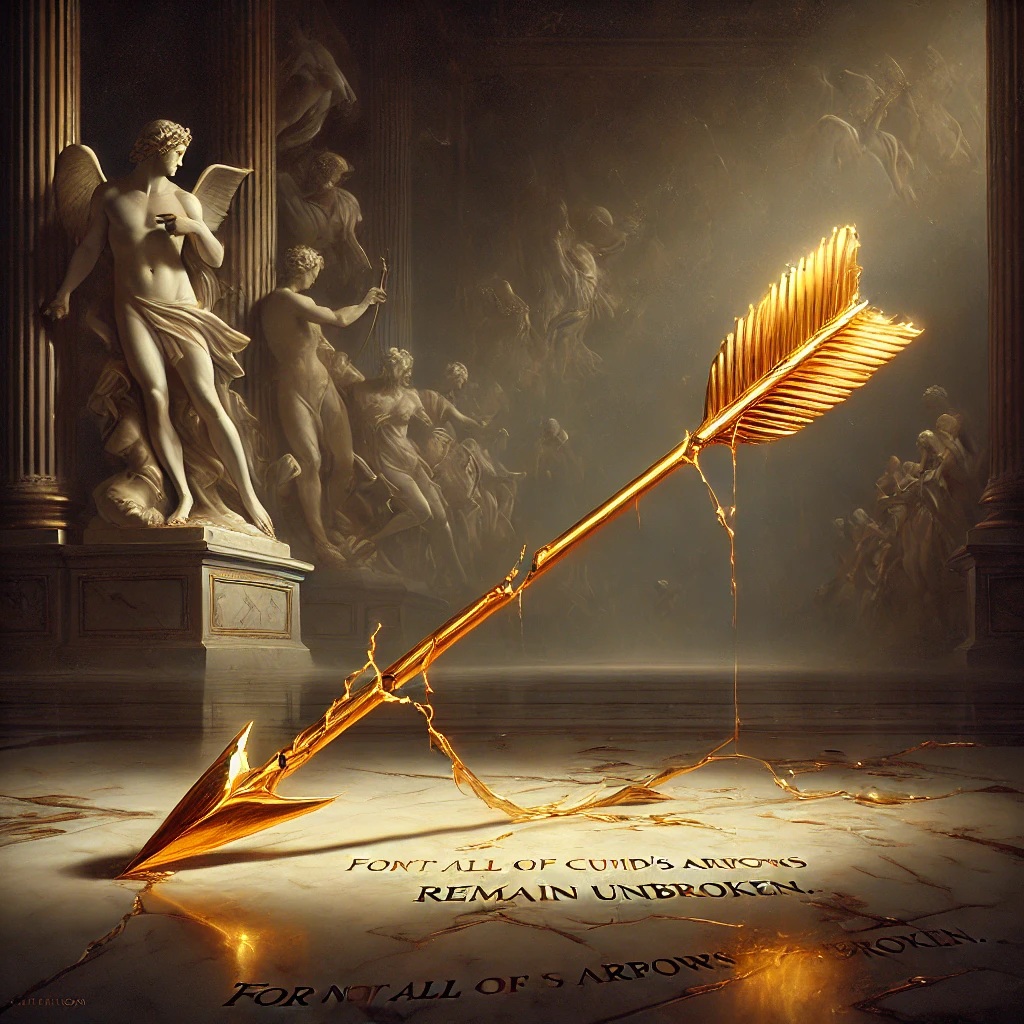
(EPILOGUE: Wherein Zeus files his complaint, Jupiter weighs his judgment, and Cupid’s torment is finally undone—though not forgotten.)
The heavens shone in argent light,
As gods assembled, grand and high.
Upon Olympus, vast and proud,
A storm was brewing in the sky.
For Zeus had called a summit great,
A council vast, a throne adorned.
With eyes like fire and voice like stone,
A king prepared to raise his scorn.
The gods arrived in gold arrayed,
The halls of thunder filled with mirth.
Yet one alone in shame reclined—
A god whose name was torn from earth.
For Cupid, pale, his lips pressed tight,
Did sit, his head within his hands.
His wings now ruffled, plumes askew,
His heart still lost in dire demands.
For still his chest did pang and wane,
For still his mind was all undone.
No spell could break his wretched plight,
No power still what fate had spun.
And still, in halls of endless night,
A king of shade, with furrowed brow,
Did turn his gaze, did shake his head,
Did mutter soft, “Oh, not this now.”
Then Zeus arose, his eyes alight,
A scroll of weight within his hand.
He cleared his throat, he raised his voice,
And thus proclaimed his great demand:
"To Jupiter, my Roman peer—"
"Thy reckless gods bring havoc here!"
"Behold my city—Corinth’s woe—"
"A love once bright, now lost below!"
"A goddess weeps, her temples bare!"
"A city mourns, no hearts embrace!"
"And all was wrought by trickster hands—"
"From thy domain—this thy disgrace!"
"See how Love, thy servant bold,"
"Now pines for Death—now weeps, ensnared!"
"See how thy jesters played their hand—"
"Now clean this folly—if thou darest!"
The words did echo, fierce and loud,
And all the halls fell hushed and still.
For Cupid, limp and lost in woe,
Could only moan, could only kneel.
Yet from his throne of marble bright,
With golden laurels, high and vast,
There sat a king, so calm, so bold,
A god of Rome, a ruler cast.
And Jupiter, in measured gaze,
Did breathe a sigh and rub his brow.
He raised his hand, he waved his scroll—
And read the charge, as if in jest.
"O Zeus, my friend, thy words are dire,"
"Thy voice is fierce, thy wrath is bright."
"Yet tell me, lord of storm and sky—"
"Why dost thou call my hands to fight?"
"The boy is Love—his fate is strife."
"He sought his war, he loosed his flame."
"If Love is lost, if Love is blind—"
"Then is it not his own to tame?"
A silence fell, a hush so vast,
As Zeus’s lips grew firm and grim.
For though the charge was rightly sworn,
Jupiter was unmoved by whim.
Yet still, as halls did shake with mirth,
As gods did whisper, jest, and cheer,
One voice alone did break the game,
One voice, so soft—so filled with ire.
For Aphrodite, fierce and bright,
Did step before the thrones so high.
Her golden form, her burning gaze,
Did shake the air, did bend the sky.
"O Jupiter, thy jest is clear—"
"Yet Love is mine, and mine to keep!"
"Shall gods be mocked, shall vows be torn?"
"Shall passion die, shall mortals weep?"
"Thy jest has played, thy game is done!"
"Now mend this folly, mend this strife!"
"If love must reign, if hearts must turn—"
"Then end his pain—return his life!"
And Jupiter, so great, so wise,
Did bow his head, did close his eyes.
For fate was turned, the jest was spun,
Yet mercy still must have its run.
Then Jupiter, in voice so strong,
Did raise his hand, did cast his rule.
His eyes did burn, his lips did part,
And thus proclaimed his fateful boon:
"Enough of folly, enough of jest—"
"Enough of Love brought low in shame!"
"His penance paid, his trial won—"
"No jest shall break his name again."
"Rise, Cupid, Love—thy fate undone!"
"Thy passion quelled, thy torment gone!"
"The arrow deep within thy thigh—"
"Shall part from flesh—thy will is thine!"
And in that space, the air stood still,
The halls did quake, the heavens turned.
As from his wound, with golden light,
The cursed dart was pulled, unburned.
A gasp, a cry, a breath unchained,
A heart released, a soul unbound.
For Cupid, freed, at last stood tall,
No longer lost, no longer drowned.
Yet still, his name was bathed in jest,
Yet still, his fate would not be light.
For though the curse was torn away,
His shame would last beyond the night.
Then Jupiter, in final tone,
Did cast his rule on those who played.
For Mercury, for Laverna sly,
For Discord’s queen, so fierce, so fey—
"Ye tricksters three, thy jest is done!"
"Now to Corinth—clean thy fun!"
"For love was turned, for bonds were torn—"
"Ye set this mess—now mend, restore!"
And Cupid, pale but standing firm,
Did bow his head at last in peace.
For though his pride was lost in time,
His heart was whole, his will released.
Then Jupiter, with mighty gaze,
Did turn to Love and speak once more.
"Now go—make right what once was wrong."
"Go forth, restore where hearts still mourn."
"Go, find thy kin—thy mother fair."
"Let Love once more be known—reborn."
And thus the halls of gods stood still,
As fate was sealed, as bonds were sworn.
And Cupid, Love, though scarred with time,
Was free to fly, to love, to mourn.
And yet, through halls where echoes rang,
Where gods still laughed, where poets spoke,
A single truth was left to tell—
A warning sharp, a jest well broke.
| Author Notes |
The jest was spun, the game was played,
Yet Love, though freed, would bear its shade. For gods may rule, and fate may bend, But mischief waits to rise again. |
|
You've read it - now go back to FanStory.com to comment on each chapter and show your thanks to the author! |
![]()
| © Copyright 2015 Tim Margetts All rights reserved. Tim Margetts has granted FanStory.com, its affiliates and its syndicates non-exclusive rights to display this work. |
© 2015 FanStory.com, Inc. All Rights Reserved. Terms under which this service is provided to you. Privacy Statement